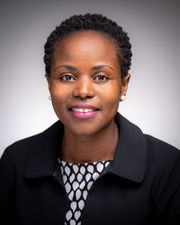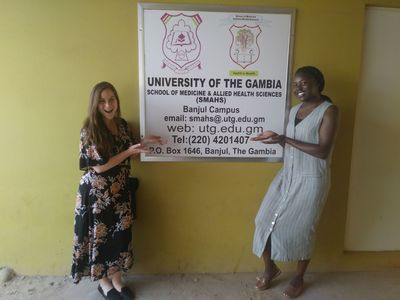 Assistant Teaching Professor, Sarah Bosha
Assistant Teaching Professor, Sarah Bosha
Assistant Teaching Professor, Sarah Bosha, along with Master of Science in Global Health alumnae, Michelle Adeniyi ‘18 and Jenna Ivan ‘18, discuss the grave danger associated with the alarming cause and effect chain initiated by The Gambia’s former president, Yahya Jammeh, in the latest Health and Human Rights Journal. Their paper examines the Gambian HIV policy, warning people that Jammeh will not be the last to tout fake cures, and describes the significant impact the Presidential Alternative Treatment Program has had on those living with HIV and involved with the Gambian HIV Response.
Additional authors include Eck Institute for Global Health affiliated faculty member and Professor of the Practice in the Department of Applied and Computational Mathematics and Statistics at the University of Notre Dame, Roya Ghiaseddin, along with University of The Gambia partners Fabakary Minteh, Lamin Barrow, and Rex Kuye. The collaboration with The University of The Gambia enabled an in-depth look into the unsettling reality behind The Gambia’s corrupt political power. This issue has raised a great deal of attention, as the individuals with HIV that enrolled in the Presidential Alternative Treatment Program have been shedding light on the truth behind their supposed “treatment.” Ultimately, this promised cure affected the quality of service delivery by health workers focused on HIV prevention, management, and treatment, creating a climate of fear that hampered HIV control measures in The Gambia. Not only did the “treatment” program violate the human rights of those individuals living with HIV, but it exposed a gap within the global health community to deal with the crisis created by former president Yahya Jammeh’s health dictatorship stemming from his Presidential Alternative Treatment Program’s fraudulent HIV cure. The challenge remains for the global health community to chart a way forward to address health dictatorships and their harmful impact on the right to health.
 2018 alumnae Jenna Ivan and Michelle Adeniyi at the University of The Gambia completing their Capstone Research Projects
2018 alumnae Jenna Ivan and Michelle Adeniyi at the University of The Gambia completing their Capstone Research Projects
The research was led by Bosha, Adeniyi, and Ivan. It was completed in collaboration with AIDS-Free World, an international advocacy organization that tackles the root causes that have turned HIV into a global pandemic.
Speaking on the value of the research project Bosha stated, “The research is significant because it highlights the importance of scientific study in advancing human rights discourse. For The Gambia, we hope the findings give a voice to those who suffered abuses and violations to their right to health at the hands of a dictator—voices that will hopefully be included in future hearings of the Truth Reconciliation and Reparations Commission, which has been gathering testimonies in Banjul, The Gambia's capital.”
Read the full paper here.
The Eck Institute for Global Health is a university-wide enterprise that recognizes health as a fundamental human right and endeavors to promote research, training, and service to advance health standards for all people, especially people in low and middle-income countries, who are disproportionately impacted by preventable diseases. The Master of Science in Global Health program provides an engaging science-centric training in the context of global health. The program is a one-year, intensive training that includes two semesters of coursework and one (summer) semester of a field practicum, with a major Capstone Project.